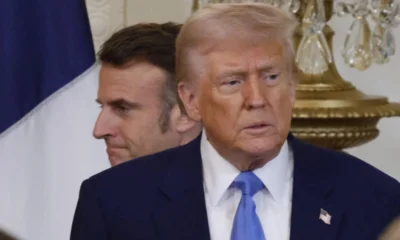Latest world news
Israel’s Mossad killed Hamas engineer in Kuala Lumpur: NYT

Latest world news
India eyes Rs 8,000 crore mid-air refuelling aircraft deal as PM Modi begins Israel visit
India and Israel are in talks for a Rs 8,000 crore deal to convert six Boeing 767 jets into mid-air refuelling aircraft for the Indian Air Force.
Latest world news
PM Modi to begin two-day Israel visit, defence and trade in focus
PM Narendra Modi begins a two-day Israel visit aimed at strengthening defence cooperation, trade ties and upgrading bilateral relations to a special strategic partnership.
Latest world news
Trump says tariffs will replace income tax, criticises Supreme Court setback in key address
Donald Trump has said tariffs collected from foreign nations could eventually replace income tax in the US, while criticising a Supreme Court ruling against his earlier import duties.
-

 Latest world news13 hours ago
Latest world news13 hours agoTrump says tariffs will replace income tax, criticises Supreme Court setback in key address
-

 Latest world news13 hours ago
Latest world news13 hours agoTrump repeats claim of averting India-Pakistan nuclear war during Operation Sindoor
-

 Latest world news12 hours ago
Latest world news12 hours agoPM Modi to begin two-day Israel visit, defence and trade in focus
-

 India News13 hours ago
India News13 hours agoShashi Tharoor questions Centre over Kerala name change to Keralam
-

 India News4 hours ago
India News4 hours agoMK Stalin predicts frequent PM Modi visits to Tamil Nadu before assembly election
-

 Latest world news3 hours ago
Latest world news3 hours agoIndia eyes Rs 8,000 crore mid-air refuelling aircraft deal as PM Modi begins Israel visit

 On Monday night Hassan Nasrallah, the leader of Lebanon’s Hezbollah, while addressing a public rally before elections, had condemned the “Israeli assassination” of Hamas engineer Fadi al-Batsh, saying that “some Lebanese minds have been killed under mysterious circumstances over the past few weeks and months around the world.”
On Monday night Hassan Nasrallah, the leader of Lebanon’s Hezbollah, while addressing a public rally before elections, had condemned the “Israeli assassination” of Hamas engineer Fadi al-Batsh, saying that “some Lebanese minds have been killed under mysterious circumstances over the past few weeks and months around the world.”














